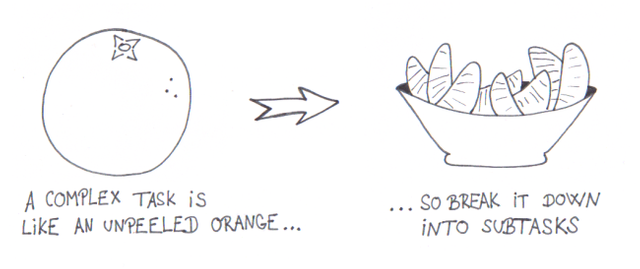Just five minutes, try to make some changes
Change is always a topic that never fades. No matter what achievement a person has, there will always be one or a few things that he/she will dissatisfy with oneself and want to make a change. Especially in this fast-paced, stressful and tempting modern society, being able to recognize deficiencies, make changes, and improve is almost always an essential skill for a motivated modern person.
However, change is not an easy task, just like "easier said than done", "know a lot of things but still living in a bad life" various claims. And, no matter what language, there will always be a similar expression, the difficulty of change can be seen in a world-wide topic.

Since change is a "just need", but it is difficult. Then naturally there are a variety of people and books try to explain and promote the occurrence of change. From Carnegie, Ogg Mandino, Napoleon Hill's self-help books, to today's cognitive science, the rapid development of the evolutionary psychology of behavioral therapy, cognitive therapy and so on.
However, no matter what kind of books and therapies, when it comes to personal change, most will mention a little trick, I call it "Five minutes Effect". (five minutes is generic, there are 10 minutes, one minute and so on, or even the number of times, such as do one push-up.)
That is, using this short five-minute advantage to lie to your brain. It is short enough to let your brain think that this is not a threat at all, so it will not take any defensive measures to achieve a certain purpose.
We can apply the "five minutes" rule to every aspect of life and change it bit by bit.
The first application scenario is to do something.
That is, when you are faced with something you have to do but do not want to do, you can give yourself a very short time to start to put into action, tell yourself to do a little bit first, it will play an unexpected effect.
For example, in the "Switch: How to Change Things When Change Is Hard", mentioned narrowing down the range of changes. Here's an example of a "five-minute room rescue operation". In less than five minutes, go to the messiest part of the room and begins to pack up and stop when the time is up. Similarly, as mentioned in the "Mini Habits: Smaller Habits, Bigger Results", do at least one push-up every day, write at least 30 words a day, is also similar practice.
The underlying rationale for such initiatives is to "deceive" our "indolent" brain (which is the protective mechanism that has evolved for tens of thousands of years), to a thing that should be done and not to do (you certainly have the experience of having a lot of work on your hands, but just can’t putt the phone away), and we can give the brain a "promise": Do a little bit first, then stop when the time is up.

The first step is always the hardest step, and once you start acting, your brain will find a better reason for your actions, and the great resistance before is gone. (Everything starts hard)
The previous "five-minute room rescue operation", in "Switch", said that many participants found that once started, there is no stopping. Similarly, after you do a push-up, you will think, “I already started, might as well do a few more.”
The second application scenario, on the contrary, is to reject something.
For example, you want to lose weight. When you see ice cream (provided ice cream is your favorite food), the desire and impulse from your heart, can't restrain to want a mouthful (excited heart, shaking hands).
At this time, you must first press the pause button, tell yourself, endure for five minutes, then if after five minutes, you still want it, then buy it. It's better to find something else to do, a distraction (Stanford Marshmallow Experiment), and then you'll find that the desire to eat the ice cream is not so hard to overcome (perhaps forgotten).
This principle, in "The Willpower Instinct:How Self-control Works,Why it Matters, and What You Can do to Get More of It," explains that if you take action a few minutes later, your brain will think of it as a future goal rather than a sense of immediate gratification (you are not the present), so the temptation is not that big. (Verified by scientific experiments)

The third application scenario, divide the task to smaller block and accomplishes the small goal first.
In practical action, a big goal (AWE) is divided into five minutes (or 10 minutes) of a few small goals (much easier), tell yourself (deceive yourself), now what I need to do now is just this small pieces of that five minutes.
When a child reads a long text or writes a lot of words (which produces fear emotions), we will use this method to tell him that you can divide it into several parts, and each time, you just have to complete one of them. This can also relieve the psychological burden.
The beauty of this approach is that even if you know its principles and understand the deceptive nature of it, it can still have a good effect. It allows you to focus on the "little" so that you won’t so concerned about the difficulty.
The fourth application scenario is buffering.
When your child is watching TV or playing games, if you tell him that time is up, stop watching/playing. Then, he would be very reluctant to stop immediately. But if you tell him, watch for another five minutes and stop after five minutes. This short five minutes (this also does not matter), will play a very good cushion role, to create a not end, but also can act as an "illusion". At the same time, you will have a concept of the end time, which will play a very good effect (get up after five minutes, do homework after five minutes, and so on).
Various kinds of psychologists put forward various experiments from all angles more or less played a number of effects.
However, in my opinion, the first thing to do is to have the determination to change and to be motivated, that is, to have the motive to change, or else it is just an empty talk.


Posted from my blog with SteemPress : http://walkinharmony.vornix.blog/2018/11/09/just-five-minutes-try-to-make-some-changes/